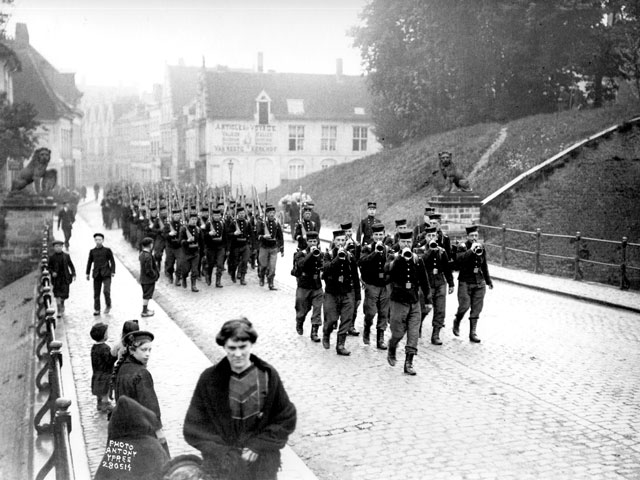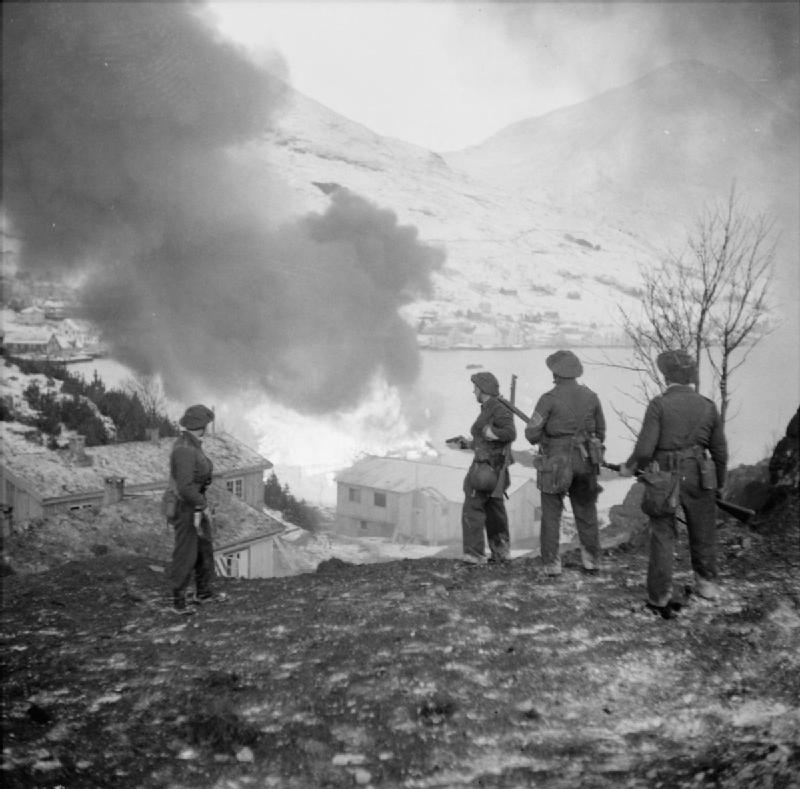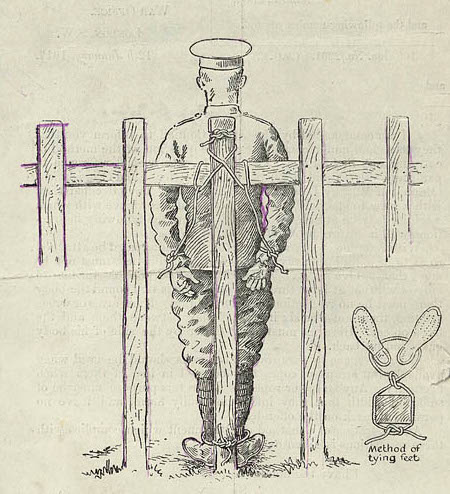|
Adam Miller (footballer, Born 1883)
Adam Miller (1883 – 21 December 1917) was a Scottish professional footballer who played in the Scottish League for Hibernian and Raith Rovers as a centre forward. Personal life Miller was educated at Eyemouth Public School. Prior to emigrating to Brisbane, Australia in 1912, he worked as a tailor and served in the Royal Garrison Artillery. In December 1914, four months after the outbreak of the First World War, he attested as a private in the 9th Battalion, Royal Queensland Regiment in Ayr. On 8 April 1915, Miller departed for the fighting from Brisbane on the HMAT ''Star of England'' and saw action at Gallipoli and on the Western Front. He was promoted to lance corporal in August 1916, but immediately reverted to private upon his own request. During the course of his service, Miller suffered from several bouts of dysentery and was twice disciplined for going AWOL, for which he received field punishments no. 1 and 2 respectively. In May 1917, Miller was recommended fo ... [...More Info...] [...Related Items...] OR: [Wikipedia] [Google] [Baidu] |
Eyemouth
Eyemouth ( sco, Heymooth) is a small town and civil parish in Berwickshire, in the Scottish Borders area of Scotland. It is east of the main north–south A1 road and north of Berwick-upon-Tweed. The town's name comes from its location at the mouth of the Eye Water river. The Berwickshire coastline consists of high cliffs over deep clear water with sandy coves and picturesque harbours. A fishing port, Eyemouth holds a yearly Herring Queen Festival. Notable buildings in the town include Gunsgreen House and a cemetery watch-house built to stand guard against the Resurrectionists (body snatchers). Many of the features of a traditional fishing village are preserved in the narrow streets and ' vennels'. Eyemouth is not far from the small villages of Ayton, Reston, St Abbs, Coldingham, and Burnmouth, all in Berwickshire. The coast offers opportunities for birdwatching, walking, fishing and diving. Accommodation includes several hotels, B&Bs and a holiday park. History F ... [...More Info...] [...Related Items...] OR: [Wikipedia] [Google] [Baidu] |
Ayr, Queensland
Ayr is a rural town and locality in the Shire of Burdekin, Queensland, Australia. It is the centre of a sugarcane-growing region and the administrative centre for the Burdekin Shire Council. In the , the locality of Ayr had a population of 8,738 people. Geography Ayr is located south of Townsville on the Bruce Highway and away from the (smaller) town of Home Hill. It is north of Bowen and north of Mackay. Ayr is located near the delta of the Burdekin River. It is within the Burdekin Shire, which produces the most sugar cane per square kilometre in Australia, accessing underground water supplies and water from the Burdekin Dam to irrigate crops when rains fail. Mirrigan is a neighbourhood within the locality (). It takes its name from the former Mirrigan railway station () which was assigned by the Queensland Railways Department on 10 September 1914. It is an Aboriginal name meaning star. Parkside is a neighbourhood within the south-east of the town (). Ayr railway ... [...More Info...] [...Related Items...] OR: [Wikipedia] [Google] [Baidu] |
Scottish Football League First Division
The Scottish Football League First Division was the second tier in the Scottish football league system between 1975 and 2013. History The First Division was introduced in 1975–76 to replace the old Scottish Football League Division Two, as the top flight of the Scottish Football League was renamed from Division One to Premier Division. In 1998, the Premier Division clubs broke away from the Scottish Football League to form the Scottish Premier League. The First Division remained the second tier of the Scottish league system, but was now the top tier of the Scottish Football League. In July 2013, the Scottish Football League and Scottish Premier League merged to form the Scottish Professional Football League (SPFL). The SPFL named its second tier as the Scottish Championship, which effectively replaced the First Division. Competition From 1994 until 2013, the First Division consisted of ten teams. From 1998, only the winner of the First Division was promoted to the Scottish ... [...More Info...] [...Related Items...] OR: [Wikipedia] [Google] [Baidu] |
1905–06 Scottish Division One
The 1905–06 Scottish Division One season was won by Celtic Celtic, Celtics or Keltic may refer to: Language and ethnicity *pertaining to Celts, a collection of Indo-European peoples in Europe and Anatolia **Celts (modern) *Celtic languages **Proto-Celtic language * Celtic music *Celtic nations Sports Fo ... by six points over nearest rival Hearts. League table Results References {{DEFAULTSORT:1905-06 Scottish Division One 1905–06 Scottish Football League Scottish Division One seasons Scottish ... [...More Info...] [...Related Items...] OR: [Wikipedia] [Google] [Baidu] |
Menin Gate
The Menin Gate ( nl, Menenpoort), officially the Menin Gate Memorial to the Missing, is a war memorial in Ypres, Belgium, dedicated to the British and Commonwealth soldiers who were killed in the Ypres Salient of World War I and whose graves are unknown. The memorial is located at the eastern exit of the town and marks the starting point for one of the main roads out of the town that led Allied soldiers to the front line. “Menin” is the traditional name of the gate in this location of Ypres' city walls because it leads to the town of Menen. Designed by Sir Reginald Blomfield and built by the Imperial War Graves Commission (since renamed the Commonwealth War Graves Commission), the Menin Gate Memorial was unveiled on 24 July 1927. In early 2023, Menin Gate will close for extensive restoration works in time for the memorials centenary in 2027. Background In medieval times, the original narrow gateway on the eastern wall of Ypres was called the Hangoartpoort, "poort" being ... [...More Info...] [...Related Items...] OR: [Wikipedia] [Google] [Baidu] |
Ammunition Dump
An ammunition dump, ammunition supply point (ASP), ammunition handling area (AHA) or ammunition depot is a military storage facility for live ammunition and explosives. The storage of live ammunition and explosives is inherently hazardous. There is the potential for accidents in the unloading, packing, and transfer of ammunition. Great care is taken in handling these dangerous explosives so as not to harm personnel or nearby ammunition. Despite the intensive preventive measures they get, ammunition depots around the world suffer from non-combat fires and explosions. Although this is a rare occurrence, there are devastating consequences when it does happen. Usually, an ammunition depot experiencing even minor explosions in one of its sites/buildings is immediately evacuated together with surrounding civilian areas. Thus, all of the stored ammunition is left to detonate itself completely for days or weeks, with very limited attempts at firefighting from a safe distance.How one ... [...More Info...] [...Related Items...] OR: [Wikipedia] [Google] [Baidu] |
Second Battle Of Bullecourt
The Battle of Arras (also known as the Second Battle of Arras) was a British offensive on the Western Front during the First World War. From 9 April to 16 May 1917, British troops attacked German defences near the French city of Arras on the Western Front. The British achieved the longest advance since trench warfare had begun, surpassing the record set by the French Sixth Army on 1 July 1916. The British advance slowed in the next few days and the German defence recovered. The battle became a costly stalemate for both sides and by the end of the battle, the British Third Army and the First Army had suffered about 160,000 casualties and the German 6th Army about 125,000. For much of the war, the opposing armies on the Western Front were at stalemate, with a continuous line of trenches from the Belgian coast to the Swiss border. The Allied objective from early 1915 was to break through the German defences into the open ground beyond and engage the numerically inferior Germa ... [...More Info...] [...Related Items...] OR: [Wikipedia] [Google] [Baidu] |
Stretcher-bearer
A stretcher-bearer is a person who carries a stretcher, generally with another person at its other end, especially in a war or emergency times when there is a very serious accident or a disaster. In case of military personnel, for example removing wounded or dead from a battlefield, the modern term is combat medic who will have received considerable training. Stretcher-bearers would have received basic first-aid training. The wounded soldier had to wait until the stretcher-bearers arrived or simply the stretcher-bearers will find them. In times of war, stretcher-bearers may in certain situations be covered by Art. 25 of the First (Geneva) Convention of 1949 under the category of auxiliary medical personnel. Origin This term appears between 1875 and 1880. It is largely used before and up to the Second World War and is derived from the British English verb ''to stretcher'' means "to carry someone on a stretcher". A stretcher-bearer party, sometimes a stretcher party or company, ... [...More Info...] [...Related Items...] OR: [Wikipedia] [Google] [Baidu] |
Military Medal
The Military Medal (MM) was a military decoration awarded to personnel of the British Army and other arms of the armed forces, and to personnel of other Commonwealth countries, below commissioned rank, for bravery in battle on land. The award was established in 1916, with retrospective application to 1914, and was awarded to other ranks for "acts of gallantry and devotion to duty under fire". The award was discontinued in 1993, when it was replaced by the Military Cross, which was extended to all ranks, while other Commonwealth nations instituted their own award systems in the post war period. History The Military Medal was established on 25 March 1916. It was awarded to other ranks including non-commissioned officers and warrant officers, and ranked below the Distinguished Conduct Medal (DCM). Awards to British and Commonwealth forces were announced in the ''London Gazette'', but not honorary awards to allied forces. (Lists of awards to allied forces were published by The Na ... [...More Info...] [...Related Items...] OR: [Wikipedia] [Google] [Baidu] |
Field Punishment
Field punishment is any form of punishment used against military personnel in the field; that is, field punishment does not require that the member be incarcerated in a military prison or reassigned to a punishment battalion. It may be formalised under a system of military justice and may be a sentence imposed in a court martial or similar proceedings In English language contexts, "field punishment" refers specifically to Field Punishment Number One, which was used by the British Army between 1881 and 1923 and the armies of some other British Empire countries. British Army 1881–1923 Field Punishment was introduced in 1881 following the abolition of flogging. It was a common punishment during World War I. A commanding officer could award field punishment for up to 28 days, while a court martial could award it for up to 90 days, either as Field Punishment Number One or Field Punishment Number Two. Field Punishment Number One, often abbreviated to "F.P. No. 1", "No. 1 field", ... [...More Info...] [...Related Items...] OR: [Wikipedia] [Google] [Baidu] |
AWOL
Desertion is the abandonment of a military duty or Military base, post without permission (a Pass (military), pass, Shore leave, liberty or Leave (U.S. military), leave) and is done with the intention of not returning. This contrasts with unauthorized absence (UA) or absence without leave (AWOL ), which are temporary forms of absence. Desertion versus absence without leave In the United States Army, United States Air Force, British Armed Forces, Australian Defence Force, New Zealand Defence Force, Singapore Armed Forces and Canadian Forces, Canadian Armed Forces, military personnel will become AWOL if absent from their post without a valid Pass (military), pass, Shore leave, liberty or Leave (U.S. military), leave. The United States Marine Corps, United States Navy, and United States Coast Guard generally refer to this as unauthorized absence. Personnel are dropped from their Military organization, unit rolls after thirty days and then listed as ''deserters''; however, as ... [...More Info...] [...Related Items...] OR: [Wikipedia] [Google] [Baidu] |
Dysentery
Dysentery (UK pronunciation: , US: ), historically known as the bloody flux, is a type of gastroenteritis that results in bloody diarrhea. Other symptoms may include fever, abdominal pain, and a feeling of incomplete defecation. Complications may include dehydration. The cause of dysentery is usually the bacteria from genus '' Shigella'', in which case it is known as shigellosis, or the amoeba '' Entamoeba histolytica''; then it is called amoebiasis. Other causes may include certain chemicals, other bacteria, other protozoa, or parasitic worms. It may spread between people. Risk factors include contamination of food and water with feces due to poor sanitation. The underlying mechanism involves inflammation of the intestine, especially of the colon. Efforts to prevent dysentery include hand washing and food safety measures while traveling in areas of high risk. While the condition generally resolves on its own within a week, drinking sufficient fluids such as oral ... [...More Info...] [...Related Items...] OR: [Wikipedia] [Google] [Baidu] |






.jpg)


